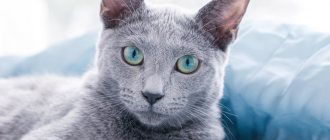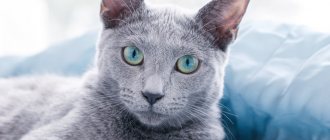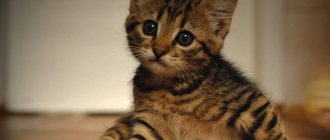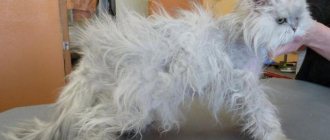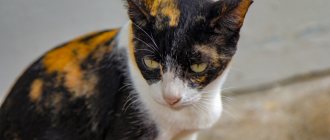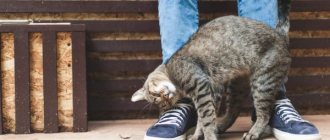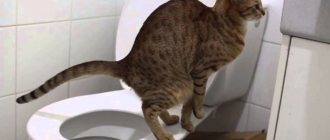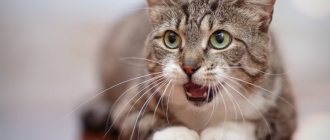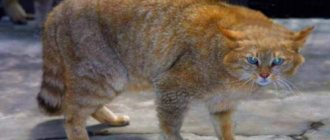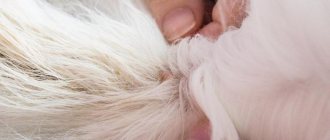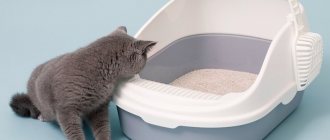Physiology
At different periods of its existence, a cat moves differently. The resulting calories from a small kitten are spent on the growth of bones and muscles; the remaining calories are required for play.
The body of older cats may dry out due to age and for some other reasons, including:
- illnesses and stress;
- lack of vitamins;
- lost teeth;
- parasites.
Owners of older cats should closely monitor their condition and take them to the veterinarian if necessary.
Causes
The following are the causes of diseases accompanied by increased drowsiness:
- Rhinotracheitis.
- Leukemia.
- Urolithiasis disease.
- Diabetes.
- Panleukopenia.
- Coronavirus peritonitis.
- Worms.
Rhinotracheitis
An extremely contagious infection, symptoms resemble those of human influenza. In addition to drowsiness, cough, runny nose, lacrimation, and hyperthermia are observed. Immunomodulators and symptomatic agents that eliminate the above symptoms are used. The most dangerous are conjunctivitis, leading to loss of vision. Prevention consists of regular immunization of the animal.
Conjunctivitis with rhinotracheitis
Leukemia
Caused by a retrovirus. The hematopoietic system is affected. The body is defenseless against all kinds of contagions. Hyperthermia, anemia, and respiratory diseases develop. When kept in crowded conditions, the disease spreads quickly. Specific treatment is ineffective. Symptomatic remedies can prolong the life of a pet. Timely immunization helps protect your cat from the disease.
Urolithiasis disease
The first signs are subtle. Activity decreases, appetite disappears, and discomfort occurs when urinating. The state of health worsens gradually:
- The abdomen becomes bloated and painful.
- When urinating, the animal is in pain, the cat meows pitifully.
- Demonstrative urination begins anywhere.
- Hematuria is manifested by pink discoloration of urine.
Blockage of the urethra by stones is characterized by vomiting, convulsions, cessation of nutrition, and possible rupture of the bladder. In such situations, surgical intervention is required. Treatment involves alleviating the animal's suffering and prolonging its life.
Diabetes
Mostly obese older animals suffer. The disease is characterized by high glucose concentrations. To dilute the blood, the cat constantly drinks. Another way to eliminate excess sugar is to urinate frequently. Since the tissues do not absorb glucose, they require additional nutrition, which is manifested by gluttony. At the same time, the cat begins to gradually lose weight.
The fur becomes disheveled and falls out. For therapeutic purposes, a special diet is used. A veterinarian caring for a sick cat will have to learn how to administer insulin and do so throughout life at intervals determined by the veterinarian.
Worms
- Constipation alternates with diarrhea.
- Unsteady gait.
- Regurgitation with balls of helminths.
- Conjunctivitis.
- Anal itching.
- The stomach is bloated.
- Impurities of blood, mucus, fragments of helminths or whole individuals are found in the feces.
- Cough. Roundworm larvae injure the lungs.
- Allergic reactions.
- The fur becomes dull and falls out.
- Appetite increases and body weight decreases.
Antihelminthic drugs are used for treatment.
Panleukopenia
A dangerous disease with high mortality. The causative agent is parvovirus. Young and old cats suffer. Animals become infected through the bites of blood-sucking arthropods, as well as through the oral route. First, the virus attacks the bone marrow, leukopoiesis is disrupted, and panleukopenia occurs. When the contagion becomes scarce in food, it moves into the intestines, causing enteritis.
Among the many signs of the disease are the following:
- Loss of appetite.
- Refusal to drink.
- Hyperthermia followed by hypothermia.
- Vomit.
- Diarrhea.
- Blue gums.
- Cardiac pathologies.
- Rhinitis.
- Conjunctivitis.
The treatment concept includes the following areas:
- Antiviral therapy.
- Symptoms:
- Fighting dehydration.
- Antimicrobial therapy.
- General strengthening drugs.
- Restoration of digestion.
Prevention of the disease is timely vaccination.
Coronavirus peritonitis
This pathology is rare when kept individually. Nursery residents get sick more often. Weakened animals suffer from prolonged diarrhea, which results in mutation of the virus and the development of symptoms of coronavirus peritonitis:
- The state of depression intensifies.
- The cat is losing weight.
- Anemia develops, manifested in pallor of the mucous membranes.
- Vision is impaired.
- A pyogranuloma is formed.
- Ascites or pleurisy occurs.
- The liver and kidneys are affected.
- The pathogen acts on the nervous system, causing convulsions.
- The cat tends to hide in a dark place.
Coronavirus peritonitis
A positive treatment result is achieved by using anti-inflammatory drugs, as well as immunocorrectors.
We invite you to join our Zen channel and group on VKontakte or Odnoklassniki, where new articles for pet owners are published.
Similar articles:
- My cat has a nosebleed - what should I do?
- Inflammation of the lower lip in a cat
- Clear nasal discharge in cats
Normal weight
On average, an adult animal should weigh from 3 to 8 kg. Such a cat drinks a lot of fluids, eats, and leads an active life.
The doctor determines the degree of fatness based on the following criteria:
- Exhaustion - the cat has no subcutaneous layer, protruding ribs, a retracted abdomen, and a thin, dense tail.
- Disadvantage - bones and ribs are visually visible, but there is already a small amount of fat. The cat's figure resembles an hourglass.
- The ideal is the presence of a thin subcutaneous layer, the ribs are not visible, but can be easily felt, the body size is proportional.
- Excess – under a thick layer of fat it is almost impossible to feel the bones. If you look at the cat from above, the back appears broad.
- Dangerous excess - bones cannot be felt, folds are present on all parts of the body.
Why is a cat losing weight?
Pathology
If a cat eats a lot of food, but loses weight, there are several reasons:
- Presence of parasites . Worms or helminths can destroy a pet’s body from the inside. Even though the cat eats a lot of food, he continues to lose weight. A cat can become infected with helminths through dirty shoes, unwashed hands, or a dirty litter tray. You can get rid of parasites only by using special medications (treatment is carried out for at least six months).
- Diseases of internal organs. In diseases, there are two mechanisms for losing weight: lack of appetite and small doses of food consumed; and the process of digestion and absorption of food is disrupted. Endocrine diseases and pathologies of the digestive system lead to weight loss even when eating enough food. Associated symptoms are apathy, hair loss, diarrhea or constipation, etc.
- Stress. If an animal is stressed for a long time, it may lose weight even with a good appetite. If a cat is depressed, there may be no appetite at all, which also affects weight. Well, you need to wait for the cat to return to normal; neurological disorders require treatment and sedative medications.
- Infections. Infectious diseases are always accompanied by weight loss. All because the pet refuses food and water. The most common diseases are calcivirosis, rhinotracheitis, viral peritonitis, and panleukopenia. Often these diseases lead to the death of the pet.
- Tumors. Any malignant neoplasms can cause exhaustion in a cat. The animal has no appetite, hair falls out, and vomiting and diarrhea are possible.
- Allergy. If there is an allergic reaction, the cat may lose its sense of smell, making it difficult for it to perceive food. She will eat less and lose weight.
Don't forget about vaccinations. Most people believe that if an animal lives in a house, it cannot get sick. We can bring various viruses and infections with clothes or shoes, and cats living at home are more susceptible to them than street cats.
Physiological reasons
The conditions in which the animal is kept also matters. Here the reasons for weight loss can be:
- Mating period. During this time, pets may forget about food and lose body weight. At the end of the period of “festivities” the animal returns to normal. Changes in temperature. In winter, the cat accumulates fat; in summer, the fat is absorbed.
- Pregnancy . During pregnancy, a cat's appetite is always good, but as soon as she starts feeding kittens, she may lose weight. Everything will fall into place as soon as the feeding period is over.
- Feed. A cat's weight directly depends on the quality of food consumed. You cannot suddenly change her diet from dry food to homemade food. Due to menu changes, the pet always loses weight.
Most owners do not check the weight standards for their pet, taking into account its age and breed.
The cat has frequent vomiting, weakness, weight loss
Rosalia, Moscow
3223 views
May 16, 2018
Good afternoon. The question concerns a cat. She is less than 8 years old, female, mixed breed (mongrel), medium-haired, vaccinated and sterilized, exclusively domestic, we are not allowed outside. The last time was dewormed in October 2021 with Drontal. This is the situation. About 9 months ago she began to vomit periodically for an unknown reason (about once every 2-3 weeks). There is no blood in the vomit, but sometimes the vomit is yellowish in color or contains a little whitish foam. Occasionally, problems with stool appeared - the cat could not go to the toilet for “generally” 5-6 days, and when it was possible to go (sometimes with the help of Vaseline oil), the stool was somewhat dry and hard. On such days the animal was apathetic and did not particularly ask for food. But on other days the animal’s appetite was normal. She could eat, burp and immediately ask for food again. We feed Royal Canin for sensitive digestion and natural food (but in the early years we fed Purina One). The cat was moderately active for her age - she ran around the apartment and played. Veterinarians in our city are not particularly competent in problems with the gastrointestinal tract, so the cause of vomiting was explained by the fact that “there was licking of fur.” But what kind of wool??? The animal is not long-haired, has normal smooth fur, and does not shed much. They did an ultrasound. As they wrote in the ultrasound, there are signs of cholecystitis on the part of the gallbladder. They gave me an anibiotic injection and gave me Ringer's solution once. That's all the treatment. Now the cat's condition has worsened. Vomits much more often. Yesterday, for example, I vomited 3 times a day. Immediately after eating. There is often strong rumbling in the stomach. And recently, for the first time, I peed several times not in the tray, but in another room on the floor. And I also pooped not in the tray. But this is not permanent. Mostly goes to the litter box. Today the animal is lethargic, apathetic, mostly sleeps, and does not ask for food. He only gets up to drink water. Before the illness, my weight was 5 kg, now it’s 3.3. So, the questions: 1) What examination must be carried out without fail (laboratory tests, instrumental diagnostics)? 2) Is it necessary to perform a gastro-colonoscopy? MRI? We are ready to take the cat to Moscow, because... In our city, apart from an ultrasound machine, the veterinary clinic has nothing at its disposal. 3) What kind of approximate diagnosis can be made and how to alleviate the animal’s condition? 4) Could all this be psychosomatic in nature? Could the nature of this condition be due to nervousness? (This is a peculiar behavioral reaction - after all, the cat’s vomiting and malaise began precisely with the change of owner, and the animal’s character was initially not resistant to stress, timid). Could these cases of defecation past the litter box be associated with resentment, revenge, or attracting the attention of the new owner? (she doesn’t really communicate with the cat. She only feeds and cleans up after her). Maybe this is a case of animal psychology? Sorry that there are so many questions - in our city there is no one to turn to for help. Thanks in advance for your answer.
The question is closed
vomit
cat
weight loss
Dangerous and safe symptoms
You shouldn’t worry when your cat is thinner if he has:
- a certain breed - Bengal, Somali, Abyssinian;
- active lifestyle;
- age more than 10 years;
- change of lifestyle (moving, new litter box, new owner).
If the pet is in a calm state, but is suddenly losing weight, then the symptoms of the disease may be:
- drowsiness;
- At first the cat led an active life, then suddenly became lethargic and apathetic;
- loss of a large amount of hair;
- blood in excrement;
- nausea, constipation or diarrhea;
- heat;
- blanching of the mucous membranes.
Treatment
In case of physiological reasons, no measures should be taken . But if there is a pathology, you need to get rid of it as soon as possible.
The cat must be shown to a veterinarian, who will order an examination, blood and stool tests, and x-rays. Once the picture becomes clear, the doctor may prescribe:
- medicines;
- vitamin supplements;
- change of diet;
- change of activity mode.
How to feed
If a cat loses body weight, the fault may lie with its owner, who incorrectly compiled his daily menu. There are rules, if followed, the cat’s weight will always be normal:
- Mixing dry food and homemade food is unacceptable. A cat develops one type of digestion, which is aimed either at “artificial” food or at natural food. When feeding dry food, your cat needs more fluid. If you change your diet frequently, your stomach will not be able to adapt in time, and you will begin to lose weight.
- Don't trust advertising. Such well-known brands as Whiskas and Kitiket are not a sign of quality. They are accessible to everyone, but contain attractions. These components are addictive. This is a serious burden for the pet’s stomach and intestines. You can extend your cat's life if you feed him food from a specialized store.
It is necessary to give preference to only one food option, otherwise, in addition to weight loss, various diseases may develop. This is natural food or branded industrial food.
ATTENTION! The packaging must be labeled holistic, premium and supreme. These are classes that indicate that all production standards have been met.
Has your cat lost his appetite?
Veterinarians do not recommend panicking if an animal suddenly refuses to eat. A cat’s poor appetite can be caused by the animal’s own decision to arrange a so-called fasting day.
This often happens due to the following factors:
- the day before the pet overate and is simply digesting yesterday’s food;
- the cat protests against monotonous feeding;
- resentment towards the owner for various reasons;
- voluntary fasting , instinctively necessary for the cat family in order to cleanse the stomach and intestines.
Loss of appetite in a cat can be observed once a quarter; veterinarians consider this phenomenon harmless in the absence of signs of any diseases.
Om-Nom-nom!..
Natural food
A cat's diet should contain two types of products: meat and fermented milk.
The meat diet must include beef, cut into small pieces. To get vitamins, you need to add vegetables or special additives to the meat. In pet stores you can buy special powders containing all the necessary vitamins.
ATTENTION! Fermented milk products include low-fat cottage cheese and kefir (1%). Cottage cheese should be on a cat’s menu 1-2 times a week.
Grass
If a cat is losing weight, its diet must include green grass. It is necessary to normalize the functioning of the digestive system. The herb contains manganese, zinc, pantothenic acid, and various vitamins that help the body get rid of parasites and strengthen the immune system.
Forcing your cat to intentionally eat more food can be dangerous. Excess weight increases the load, reduces the pet's activity and leads to the development of various diseases.
If you constantly monitor changes in your pet, you can notice the symptoms of the disease in time.
IMPORTANT! Monitor the animal’s weight and lifestyle, feed it the right food. This will not only improve your well-being, but also prolong its life.
How to stimulate appetite?
If the reasons why the cat has stopped eating are not related to diseases and viral infections, the owner should start stimulating the animal’s appetite.
If the cat refuses a new type of food, it is advisable to return to the old food option. If this is not possible, you will have to wait until the animal is very hungry and will have to eat the food offered.
An excellent option for stimulating appetite is to take cat vitamins, which contain mint, seaweed, yeast and other useful ingredients. This composition improves metabolism, strengthens the immune system and increases the cat’s appetite.
Sphinx
